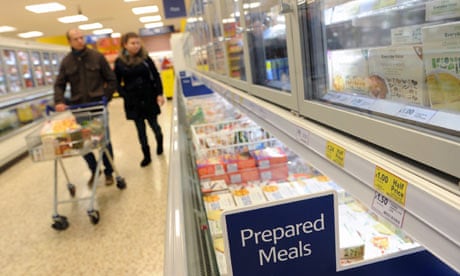It is the Irish beef company that is at the heart of the British and Irish supply chains – and its owner, beef baron Larry Goodman, is no stranger to controversy.
His previous company was identified in a public inquiry in the Irish republic that examined major frauds in the industry and efforts to cover them up in the 1980s.
Paul Finnerty, the chief executive of Goodman's ABP food group, will on Tuesday give evidence to MPs on the environment, food and rural affairs committee – inquiring into the horsemeat scandal – after it emerged that the company supplied Tesco with beefburgers that turned out to be 29% horse.
An ABP factory in Tipperary supplied the meat that was made into fresh beef bolognese sauce for Asda that the supermarket found to contain 5% horse.
ABP's Scottish factory also supplied beef meatballs to Waitrose that the retailer found had up to 30% undeclared pork.
But it is not the first time a Goodman company has been in focus – an Irish public inquiry known as the beef tribunal was established to investigate allegations made in a World in Action programme and in Ireland's parliament that predecessor companies controlled by Goodman had passed off inferior beef trimmings as higher grade meat and falsified weights on meat boxes.
The 1,400 page tribunal report found that many of the allegations relating to fraudulent practices were substantiated.
Susan O'Keeffe, an Irish senator who was the journalist behind the World in Action investigation, believes there are some parallels with the horsemeat scandal.
"Secrecy in the food industry has driven us to this current crisis and it is as unacceptable today as it was 20 years ago.
"We cannot rely on paper trails for information because we know from experience that paper trails can be – and are – faked."
The tribunal established that Anglo-Irish Beef Processors (AIBP) – one of Goodman's previous meat processing companies – had been caught by customs officials making fraudulent claims for EU subsidies. Customs officers decided to thaw out the meat to check it more thoroughly and found that 15% of the beef was cheap trimmings. AIBP blamed a subcontractor at the time.
The most widely publicised aspect of the tribunal findings in relation to Goodman companies was its investigation into political influence. Goodman was an exporter of beef to Iraq to feed Saddam Hussein's army, but when Iraq invaded Kuwait and Saddam defaulted on the debt, Goodman's companies claimed about £100m from the Irish state.
It was alleged that Goodman had been favoured inappropriately in being underwritten with insurance paid for by the government, but the tribunal ruled that Charles Haughey, the then taoiseach, had not made decisions improperly, but instead because he believed it was in the national interest to support one of Ireland's most important economic sectors.
In fact Goodman's companies bought much of the beef sold to Iraq from other countries rather than Ireland. The tribunal found that 84% of the beef delivered to Iraq by AIBP in 1987-88 did not comply with written contracts that it should be halal. AIBP said Iraq knew it was getting different stocks and the matter was one of private law and not within the tribunal's scope.
Today's Irish government is also facing criticism that it was too slow to inform others and had remained close to its beef industry. Britain's environment secretary, Owen Paterson, has said his current Irish counterpart, Simon Coveney, only told the UK of the problem in January, rather than when it first became aware of it in November. Coveney's brother Patrick is chief executive of Greencore, an Irish food processor that made the Asda bolognese sauce found to contain 5% horse. Greencore, however, says its own tests on the same beef batch came up negative for horse DNA.
ABP said: "We are surprised that you should consider it appropriate to repeat allegations dating back to the 1990s. The tribunal found there was no institutionalised fraud or abuse in the AIBP factories. It also found there were no improper payments made to politicians. Not a single complaint was made to it by any customer of AIBP. The allegations which were made by the World in Action programme were not upheld by the tribunal report."
The company also said it was a victim, not a player, in the horsemeat adulteration.
